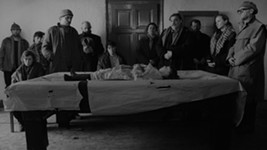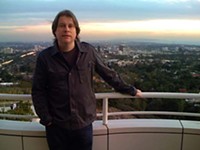Dark Side of the Potterverse
Brad Neely's 'Wizard People, Dear Readers' and the volatility of artistic alchemy
By Spencer Parsons, Fri., July 23, 2004

The God-Wheel of Fate has stopped for all these kiddies on Yes! Yes to life! And yes to magic! – Brad Neely, Wizard People, Dear Readers
It is an irony cherished by just about every smarty-pants American grade-schooler worth hanging out with that Francis Scott Key set the lyrics of "The Star Spangled Banner" to the tune of a popular drinking song. Call it artistic appropriation, theft, or piracy, it's as American as our national anthem, manifest destiny, and rock & roll. So then why is it that from Star Wars re-edits to Danger Mouse's Gray Album, we get our boxers in such a bundle over intellectual property?
Because of money, of course. But even when the only cash trading hands goes to the proper copyright holders, we still insist on pitching a legalistic fit over the provenance of the source material appropriated in something new. Case in point: There's an American artist working the counter at Toy Joy, responsible for making the other great Harry Potter movie of the summer – Harry Potter and the Sorcerer's Stone played with an alternate narration track and retitled Wizard People, Dear Readers – but the quality of the work gets rather less ink than the tedious question of whether the damn thing's breaking a law.
You'd hardly know skill or work (or anything more than goofing off) entered into the theft from the coverage by publications from The Guardian to Salon to the American-Statesman or The New York Times. And I confess that my own brief write-up about it in a profile of this year's New York Underground Film Festival for Filmmaker magazine wrapped up in a lame joke about Warner Bros. waving its "cease and desist wand." And now I've begun this very article bitching about it all.
But there's no doubt that Creased Comics author and musician Brad Neely deserves the attention, because what he's made is very good indeed. And the premiere screening at New York Underground piqued the interest of a lot of people, among them Laurel Row, managing director of the Cinematexas International Short Film Festival (for which this writer used to be a staff member and now serves as a curator at large).
"I've known Brad awhile and knew a bit about Wizard People, but until I saw it in New York, I had no idea! I mean, it's so incredibly funny and intelligent, and the style and ideas fit Cinematexas so well that I knew we just had to get it shown in Austin as soon as we could."
So, upon returning to Austin, she talked him into performing the soundtrack live. Which is to say that whether or not you've already checked out the CD with a video rental, or downloaded the MP3 from Illegal-Art.org, you'll want to get your ass to the Alamo Downtown for one of the shows running this weekend.
I am a beautiful animal! I am a destroyer of worlds! I am HARRY FUCKING POTTER!
Imagine a grizzled, intense poet hired by mistake to record a cigarette-scarred book-on-tape of J.K. Rowling's Harry Potter and the Sorcerer's Stone without having actually read it before. And imagine that instead of reciting from it at the recording session, he simply watches the ultra-faithful Chris Columbus screen adaptation with the sound off, improvising a blow-by-blow rant on what he sees, what he wants to see, and what he knows he can't see.
A CD to be played while watching the video, Dark Side of the Rainbow-style, Wizard People, Dear Readers begins as a breezily casual goof on the Harry Potter mythology: cheeky, knowing, and seemingly impossible to sustain over 2½ hours of bloated Hollywood blockbuster. But hold on, dear readers: Beyond the spoofy surface of "fuck words," silly, mistaken names (Haggar the Horrible, Mouthoil, Hardcasstle McCormick), sly pop-culture allusions (a monologue that sails into Jaws' waters), or mentions of Harry's alarming alcohol consumption ("Another tequila sunrise!"), lies a more tenacious and original sort of parody than you might expect.
"I wanted this narrator to speak for the audience's point of view to bring out undercurrents so you can't miss or dismiss them," Neely says. "And also as this long movie gets drawn out, he gets drawn out too, more raw ... and of course that's how I was as I went on with it."
The approach impresses Cinematexas artistic director and experimental film distributor Ralph McKay. "Aside from the crazy narrative Brad builds over the original story, he brilliantly reads and analyzes the suffocating banality of the original film. While the narrator races to keep the viewer up with the progress of the various characters, he can't resist constant asides about the film they exist within."
As alternative soundtracks go, it's less about mockery than is Mystery Science or Mister Sinus, depending more on sustained mood and character than on free-standing punch lines. Though I'm doubtful that Wizard People really constitutes a new genre or artistic form, as some partisans claim, it certainly stands as its own beautiful animal amid the growing herd of DVD commentaries and digital fan-fictions. For my money it bests even the Coen brothers' outrageously nonsensical "film historian" track for Blood Simple: Forever Young, essentially a conceptual prank that has more to do with the mere fact that they went through with it than with whether anyone should actually listen to the whole thing. Hilarious it might be, but as darkly happy as I am at its very existence, any five minutes is sufficient to drive me up a wall (which probably makes those black-hearted Coens very, very pleased).
This far more ingratiating and rewarding takedown/tribute gets funnier as it goes along because the affectionately delirious reading of the story keeps going deeper. It delves into the subterranean psychology of the Potterverse, ultimately to discover an increasingly autonomous, and lovable, character: the narrator, who gets lost in tangents about Harry's elaborate dream-life, the homoeroticism of Quidditch, and whether Heaven is for wimps who can't hack Nothingness. He ascends to dizzy peaks of adulation and mixed metaphor, only to collapse hilariously into confusion and profanity.
Neely avers that strong character is essential: "Slipping behind the guise of a persona, you can get away with saying lots of things you'd feel too exposed to say as just yourself. Like in Moby-Dick, I think it's incredible the way that Melville talks through Ishmael to put across all these big, crazy philosophical concerns in a flowery style that he can use because it's put through the comic filter of this great narrator."
He is outside of people, and the wine flows.
Appropriately, it all got started in a bar. "Some friends and I were out drinking," as Neely tells it, "and we saw this intense guy over in the corner shooting pool, hat masking his face, wearing dark glasses and a Walkman. All by himself. And he looked so focused that we were like, 'What's he listening to?' And we start pitching ideas to each other, trying to be funny, and somebody said it was probably a book on tape of Harry Potter. So then all at once, I'm doing this voice of Steven Jesse Bernstein, the poet, saying, 'then Harry gets on his broom and rips the air a new one.' Just rattling off a bunch of raunchy stuff, and everybody there started telling me that I really should actually make the book on tape, and so I ended up making this."
A constant performer and natural mimic, Neely does a lot of impersonations in casual conversation. He'll leap into the voice of Stan Lee or Robert Duvall or South Park's Eric Cartman to make his points. And if he knows you well enough, he'll probably start impersonating you, too. And on that night, he just happened to pick Bernstein.
"It really could have been anybody, but I just happened to go with Bernstein, whose readings I really love and I've been listening to forever. He's really intense and gritty, with this kind of hilarious sadness to his word choice and delivery. So that really crystallized it, with the whole vocabulary and mode of address and everything."
The Bernstein connection is more than an apt choice for opening up the Potter mythos. "The Face," one of Neely's favorite pieces, concerns the poet's struggles with his own appearance and related self-loathing; so, in Wizard People, he zeroes in on the grotesqueries of the Hogwarts world. Here he dwells on the feebleness of "nearly dead Dumbledoor," and there on the hideousness of a teacher whose face resembles a "happy pizza left in a chicken house covered in feathery bird sweat and oily discharge. Yuckers!"
And not incidentally, he uses these observations to reflect Harry's interior uneasiness with his own power, the alienation and gathering rage of being not merely talented or even a celebrity, but an all-out messianic figure. It's a strain in the Rowling books and Warner Bros. films that's frankly creepy, but the "hilarious sadness" Neely taps into through the voice grounds the film in a critique of the mythos that is oddly heartfelt, even personal, rather than snide or scathing.
"I really felt that this guy should be in love with these characters. He has this amazing passion for them and their world, and desperately wants to connect with the audience by making them love the story, too. But like someone who overacts when reciting their favorite poem, he reveals the great overt passion in the work as well as its absurdity."
Time is stuck on the cog of Harry's will.
Of course, Wizard People has its hits and misses. For all the inspired, lunatic riffs, there are longueurs, bad jokes, obvious failures to fill dead air, and the last five chapters or so are admittedly a rush job. While Neely plans revisions for the live shows, Wizard People already survives its own and the film's deficiencies through a surprisingly careful and musical attention to rhythm and structure.
"Some things were just so god-awful boring that I had to depart and really make stuff up, and other things would just be a little too repetitive. So I had to think of it like putting together an album. You don't want too many songs that sound the same on it, and you need to think about how to pace out the singles so that not only do you avoid piling up all the peak moments together, but you make songs between that support and build up the singles to show them off at their best."
"All along, I'm trying to stay true to the essence of the persona, to make it feel junky where it needs to – intentionally messing up in some places, and figuring out where my own screwups work in others," he says. "That's a certain kind of comedy. You laugh at the two guys in the horse costume when they come apart and look like crappy performers, but maybe they had to work their asses off to make it funny and not just crap."
There's love in this much thought and effort lavished on a project originally intended for his immediate social circle: "When I made this, it was really just to make about five guys laugh," says Neely. "Sure, I figured it was an idea that might go over with more people, but that's not why I did it."
That's all anyone ever does anything for, anyway; the sake of a story to be made of them.
In keeping with the fine history of private work that goes public, one friend happened to be Kendra Gaeta, festival director for the New York Underground. She found Wizard People hilarious and included it in the festival, though it hadn't been a formal entry. From there, it made its way to national attention and bookings in Brooklyn, Portland, and Seattle, as well as back to Austin.
But try explaining that to the studio. According to a spokesman's e-mail lifted for this story from the American-Statesman's article of June 18, "Warner Bros. Pictures is very concerned about this unauthorized and apparently commercial exploitation of our valuable motion picture. If it continues we will certainly consider appropriate legal action." But Neely makes no money from the screenings, travels to the film's engagements on his own dime. Not to mention that Warner gets paid for rentals of the film print, in the case of the Alamo's screening, or for the DVD if you get it from the video store.
The real upshot is that for as long as there has been art, artists have stolen structures, plots, characters, and media as raw material for personal statements. The borrowing of a previously existing cultural property serves as occasion for creating something new, which actually puts it in a tradition running from Greek drama through just about everything by Shakespeare and on through Woody Allen's What's Up Tiger Lily?, René Vienet's situationist classic Can Dialectics Break Bricks?, and, well, even Troy. Modern protections of intellectual property, while not unimportant, and which often serve to protect artists, are the historical exception, not the rule.
If no less than Sophocles or Shakespeare mostly trafficked in second- and third-hand plots and characters, and if Hollywood can piss on Homer, then why shouldn't Brad Neely get a piece of Harry Potter by way of Steven Jesse Bernstein, and why shouldn't we be entertained by the real subversion beyond the alleged theft?
"It's remarkable to find someone interpreting an icon of youth consumer culture using the very language, references, and sensibilities of that culture itself so skillfully," notes Ralph McKay. "Instead of redundant, it's perfectly subversive and enlightening. There's a lot of cinema that might be regained if we lowered the bar on what is cinema while raising the way we look at it."
Of course, Brad's no Shakespeare, and he doesn't pretend to be. But if we want to protect and support any potential Shakespeares out to make five guys laugh, we better own up to the realities of artistic alchemy and leave the Danger Mouses and Brad Neelys to their work, labor intensive and magic-free. The only thing we have to lose is our boredom. ![]()
Brad Neely will perform Wizard People, Dear Readers live at the Alamo Drafthouse Downtown (409 Colorado) at midnight on Friday and Saturday, July 23-24, and 7pm on Sunday, July 25. For more information, call 476-1320 or see www.drafthouse.com.










